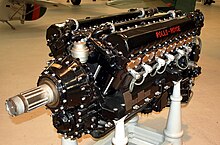Royal Air Force Museum Midlands
 | |
Former name | Royal Air Force Museum Cosford |
|---|---|
| Established | 1 May 1979 |
| Location | RAF Cosford, Shropshire |
| Coordinates | 52°38′38″N 2°18′41″W / 52.644°N 2.3115°W |
| Type | Aviation museum |
| Visitors | 382,831 (2022)[1] |
| Website | www |
The Royal Air Force Museum Midlands, located in Cosford in Shropshire, is a free museum dedicated to the history of aviation and the Royal Air Force in particular. The museum is part of the Royal Air Force Museum, a non-departmental public body sponsored by the Ministry of Defence and also a registered charity.[2] The museum is spread over two sites in England; the other site is at the Royal Air Force Museum London at Colindale (near Hendon) in north London.
History
[edit]The London museum was officially opened at the Colindale (then part of Hendon) London site on 15 November 1972 by Queen Elizabeth II. The hangars housed just 36 aircraft at opening. Over the years, the collection increased and aircraft were stored at RAF stations around the country when they were not on display to the public.
On 1 May 1979, the Cosford site was opened at RAF Cosford, one of the RAF stations which had been used to store the museum's collection of aircraft. On opening, the museum initially exhibited airframes which had been used for technical training at RAF Cosford. In the following years additional aircraft were added to the collection, and in 1980 it was agreed that the British Airways Collection be displayed at Cosford. On 21 June 1998 four additional galleries were opened, housing art, temporary exhibitions and other aviation subjects. 13 May 2002 saw the relocation of the RAF Museum Conservation Centre from Cardington, Bedfordshire to Cosford. The centre, costing £2.4 million, was opened by Marshal of the Royal Air Force Sir Michael Beetham.[3]
The Cosford site includes several developmental aircraft such as those that led to the English Electric Lightning and the second prototype of the BAC TSR-2. A lot of the aircraft are very rare, such as the only Boulton Paul Defiant in the world and one of only two surviving Vickers Wellingtons left in the world.
The first director of the museum was Dr John Tanner who retired in 1987. In 1988 Dr Michael A Fopp (who had previously directed the London Transport Museum) was appointed and was Director General of all three sites covered by the museum until his retirement in 2010.
The site can be reached by public transport via the neighbouring Cosford railway station on the Wolverhampton to Shrewsbury Line.
British Airways collection
[edit]
In 1980, the Cosford site agreed to house the British Airways Museum collection. In 2006 British Airways withdrew funding from the collection, after which the RAF Museum did not take on the costs of maintaining the aircraft. Several of the jet airliners were subsequently broken up, including the only Boeing 707 that was preserved in the UK, a Vickers VC10 and a Hawker Siddeley Trident.
National Cold War Exhibition
[edit]The National Cold War Exhibition opened at Cosford in February 2007. The exhibition houses the museum's V bombers and other Cold War aircraft in a newly constructed 8,000m2 exhibition building designed by architects Fielden Clegg Bradley.[4] The exhibition concept and design was developed by Neal Potter and includes 'silo theatres' which depict, in a variety of media, the key tensions of the Cold War period.
Aircraft on display
[edit]Engines on display
[edit]The Cosford museum houses a large collection of aero engines; the majority are located in Hangar 1, and a small side room of this hangar contains a display of rocket engines.
Missile collection
[edit]The museum holds a large collection of missiles and rocket-powered weapons, including several rare German World War II types. The majority are located in the National Cold War Exhibition, with the German collection on display in Hangar 1.

|
Michael Beetham Conservation Centre
[edit]

Also on the museum site is the Michael Beetham Conservation Centre. The centre restores aircraft and artefacts for display at both Midlands and London. It is named in honour of Marshal of the Royal Air Force Sir Michael James Beetham, GCB, CBE, DFC, AFC, DL and it was opened by him on 13 May 2002.[3]
Aircraft currently in storage or long-term restoration include:
See also
[edit]References
[edit]Notes
[edit]- ^ "ALVA - Association of Leading Visitor Attractions". www.alva.org.uk. Retrieved 18 March 2023.
- ^ "Royal Air Force Museum Midlands, registered charity no. 244708". Charity Commission for England and Wales.
- ^ a b Ellis 2004, p. 179.
- ^ Spicer, Graham (7 February 2007). "Cold War Exhibition Opens in Spectacular New RAF Cosford Building". www.culture24.org.uk. Archived from the original on 19 October 2012. Retrieved 11 July 2011.
Bibliography
[edit]- Ellis, Ken. Wrecks and Relics – 19th Edition, Midland Publishing, Hinckley, Leicestershire. 2004. ISBN 1-85780-183-0



